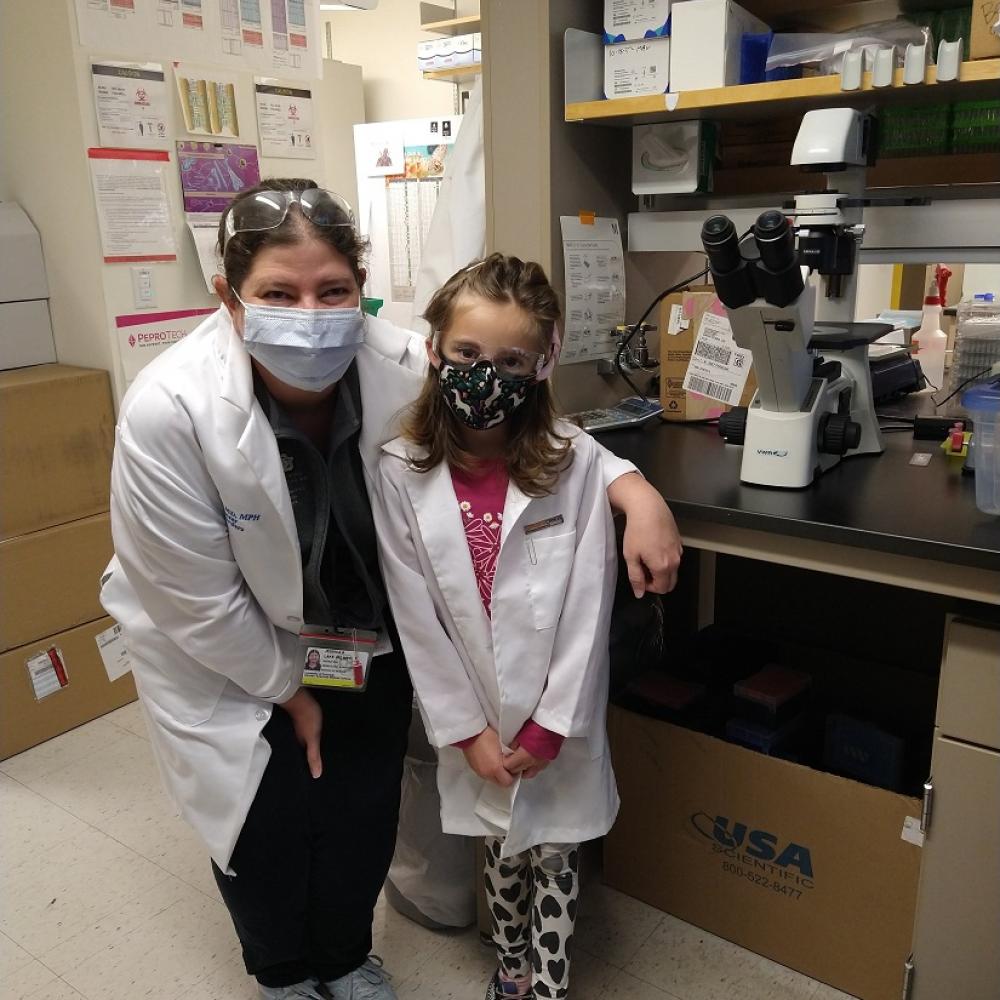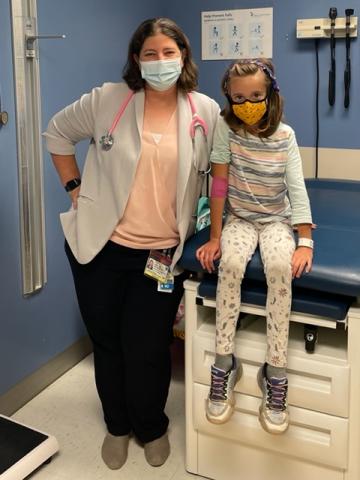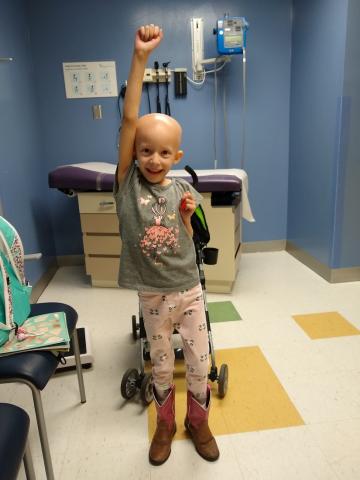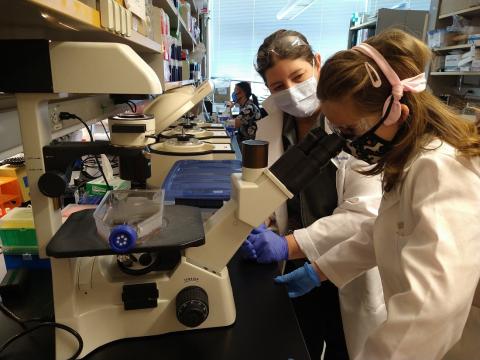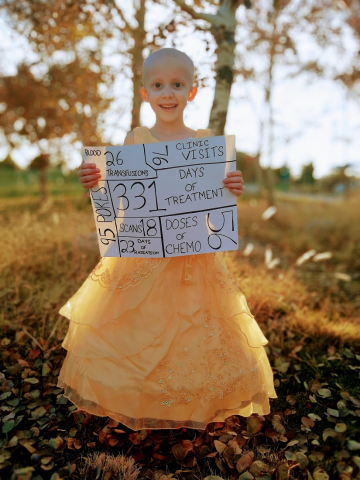These researchers have dedicated their careers to finding new treatments and cures for people with cancer.
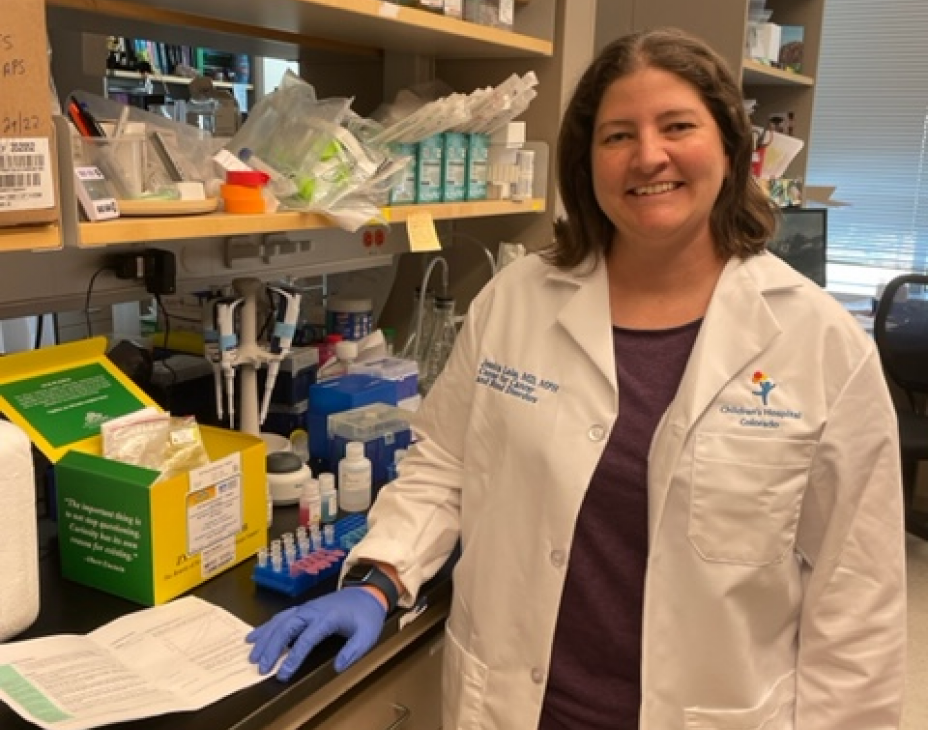
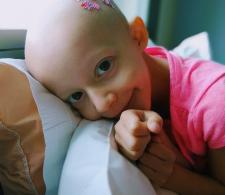
Images: Dr. Jessica Lake (above) and her patient, Mia (below)
Imagine being told you have cancer at the age of 5: The confusion and fear. Inundated by words that sound bigger than you are. Undergoing treatments that make you too sick to play with your friends or do your schoolwork.
Mia was just 5 years old when she faced exactly that reality. Meanwhile, her family was devastated.
Childhood cancer is rare, accounting for only 1%* of cancer diagnoses in the U.S. Consequently, fewer resources are dedicated to researching it, making it that much more difficult to treat. Mia had a particularly rare tumor called a rhabdomyosarcoma.
Fortunately, she had Dr. Jessica Lake, an oncologist whose research focuses on addressing these gaps in pediatric sarcoma care. Dr. Lake is also a grant recipient of Conquer Cancer®, the ASCO Foundation.
“Early in my fellowship, I saw a tremendous need for sarcoma research,” Dr. Lake says. “There were very few physician-scientists focused on sarcoma.”
The more she treated children and young adults with sarcoma, the clearer it became to Dr. Lake that they needed more options and better treatments. Accelerated research, she says, could lead to breakthroughs that would immensely improve the lives of these patients.
“I strongly believe,” Dr. Lake says, “that we are steps—not miles—away from real improvements in sarcoma care with immunotherapy.”
Advancing Immunotherapy for Every Patient
Dr. Lake studied the effectiveness of immunotherapy for young patients with sarcomas. She specifically tested chimeric antigen receptor (CAR) T cells, a treatment that leverages a patient’s own immune cells to locate and attack sarcoma tumors.
Until recently, this treatment had been helpful only for patients with blood cancers. But sustained investment in research is giving both children and adults with rare sarcomas and solid tumors a second chance at life.
“Look at the impact that CAR T-cell therapy has had, not just on pediatric leukemia, but now on other childhood and adult cancers,” Dr. Lake says. “This was not an overnight discovery. It took years of hard work and dedication from the medical and scientific community.”
That work, she continues, has resulted in new cancer research discoveries. It’s also improved and saved countless lives.
Why Childhood Cancer Is Challenging to Treat
Treating pediatric sarcoma can be challenging for a variety of reasons, including its rarity and the lack of funding to study it. Rare cancers, Dr. Lake explains, yield fewer patient samples to study and fewer patients to enroll in clinical trials. Trials often close before enough patients participate to yield meaningful results.
“It is a hard and long process. It’s human nature to want to help the most people as quickly as possible, and adult cancer research offers that potential impact. Pediatric sarcoma affects fewer people,” Dr. Lake continues. “But to the families of these children, and to the pediatric cancer community who cares for them, it doesn’t seem so rare. These young patients deserve a chance to lead long, meaningful lives.”
The Patient Impact of Research Partnership
Sustained donor support for research is vital to improve the chance of survival for children with cancer. Armed with the necessary funding, physician-scientists are much more likely to establish substantial research collaborations with colleagues around the world. Having such access to national and global partnerships in pediatric cancer research often makes it easier to exchange key findings, generate new ideas, and recruit patients for clinical trials. Pediatric oncologists like Dr. Lake need sustained donor support to pursue promising research ideas that might otherwise gather dust.
“The field is losing many incredible scientists with fresh perspectives due to lack of funding,” she says. “There needs to be more and better support for early career investigators, like Conquer Cancer’s grants and awards program. Without my Conquer Cancer grant, I would not have been able to continue my laboratory research.”
Dr. Lake received her grant in 2021, a time when the COVID-19 pandemic had significantly upended the funding landscape. The grant, she says, provided pivotal funding when other funding agencies were reducing or eliminating grants. “It allowed me to continue to study immunotherapy as a treatment for sarcomas and has led me down new avenues of research,” she continues. “It has also expanded my scientific community and allowed me to learn from other colleagues.”
Research at the Ready
Drawing from donor-funded studies that took place before she received her own Conquer Cancer grant, Dr. Lake tailored a unique care plan for Mia, who was declared cancer-free in October 2020. Since then, Conquer Cancer funding has allowed Dr. Lake to continue conducting research that could prove pivotal should Mia’s cancer recur.
As she continues the next steps in her research, Dr. Lake embraces trial-and-error on the path to new treatments and cures for every patient with cancer, no matter their age.
“Some of the greatest scientific discoveries have occurred after many failures. Any scientist will tell you that. You cannot be afraid to take risks and go down uncharted paths; otherwise, nothing new is learned. The Conquer Cancer grant helped me test new ideas and opened new avenues of research for patients,” Dr. Lake says. “This is how science evolves and breakthroughs happen: One new question at a time.”
*Cancer.Net
